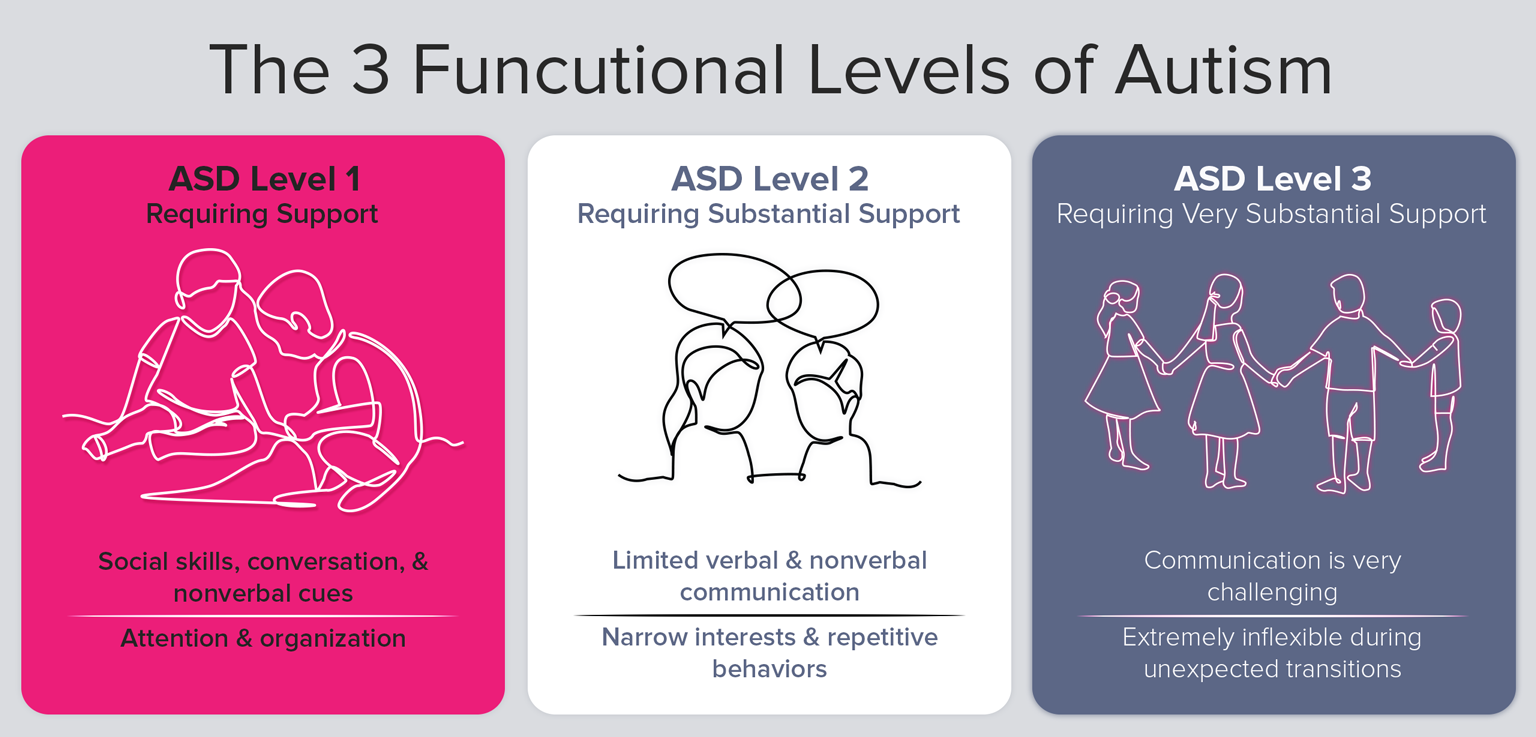 Autism is a common neurodevelopmental condition, and as it’s considered a spectrum disorder, each person has their own unique characteristics, experiencing a wide variety of symptoms and severity levels. In some cases, someone may be referred to as having high-functioning autism.
Autism is a common neurodevelopmental condition, and as it’s considered a spectrum disorder, each person has their own unique characteristics, experiencing a wide variety of symptoms and severity levels. In some cases, someone may be referred to as having high-functioning autism.
In 2013, the American Psychiatric Association published the Diagnostic and Statistical Manual of Mental Disorders, Fifth Edition (DSM-5). This edition of the DSM had some important changes to the way autism is diagnosed. Previously, diagnoses like Asperger’s Syndrome and Childhood Disintegrative Disorder were used to describe individuals at the extreme ends of the autism spectrum. High-functioning autism and Asperger’s are not an official medical diagnosis, but rather unofficial terms used to describe individuals who have mild symptoms of autism. Parents and providers in the field may still refer to these terms to indicate a level of support or degree of disability.
With the DSM-5, those diagnoses all fall under “Autism Spectrum Disorders.” Individuals with an autism spectrum disorder now include a level of severity in their diagnosis. What would have been known as high functioning autism or Asperger’s is now considered ASD Level 1.
What are the levels of ASD?

ASD is divided into three levels:
-
Level 1. People at this level may have symptoms that don’t interfere too much with their work, school, or relationships. This is what most people are referring to when they use the terms high-functioning autism or Asperger’s syndrome.
-
Level 2. People at this level require some outside support on a daily basis. Examples of outside support include speech therapy and social skills training.
-
Level 3. People at this level require substantial outside support on a daily basis. In some cases, support may include full-time aides or intensive therapy.
High-functioning autism is not an official medical term, but some people may find it helpful when determining how much support someone on the autism spectrum may require. There are ways that high-functioning autism is both different and similar to autism. Understanding these nuances may help provide someone with high-functioning autism get the support they need to thrive.
What are some signs of High Functioning Autism?
Highly Functional Autism is sometimes used colloquially to describe autistic people who do not need much support to function in their daily lives. It often means that a person can speak, write, read, manage daily tasks, and live independently. It means that their traits and behaviors do not create too many disruptions in their relationships, occupation, or education.
Emotional Sensitivity:
:max_bytes(150000):strip_icc()/259951-article-high-functioning-autism3-59e8c5470d327a00103025be.gif) Although often overlooked, sensitivity to emotions is one of the most common symptoms of high functioning autism. These individuals can function in day-to-day life but struggle to control their emotions the same way that neurotypical, or non-autistic people, are able to do. For example, a frustrating morning experience like running out of milk or being cut off while driving can cause irritability and difficulty concentrating for the rest of the day. People with autism spectrum disorder may also have unusually intense emotional reactions compared to the rest of the population.
Although often overlooked, sensitivity to emotions is one of the most common symptoms of high functioning autism. These individuals can function in day-to-day life but struggle to control their emotions the same way that neurotypical, or non-autistic people, are able to do. For example, a frustrating morning experience like running out of milk or being cut off while driving can cause irritability and difficulty concentrating for the rest of the day. People with autism spectrum disorder may also have unusually intense emotional reactions compared to the rest of the population.
Fixation on Particular Subjects or Ideas
Linguistic Oddities
-
learning to speak
-
building vocabulary
-
holding conversations with others
Social Difficulties
 Parents and teachers may notice that young autistics have problems interacting with their peers. These high-functioning autism symptoms in children and teenagers can include:
Parents and teachers may notice that young autistics have problems interacting with their peers. These high-functioning autism symptoms in children and teenagers can include:-
a limited social circle
-
problems sharing toys or materials
-
difficulty completing group work
Problems Processing Physical Sensations
-
noises
-
tastes
-
smells
-
feelings
Devotion to Routines
People with High Functioning Autism are typically devoted to routines. They may stick with routines developed for them by others, such as reading for exactly 15 minutes before going to bed or brushing their teeth exactly five minutes after eating a meal. Any sort of deviation from the routine could cause frustration.
Development of Repetitive or Restrictive Habits
Repetitive habits may also be symptoms of High Functioning Autism in adults. Those habits could interfere with the person’s ability to do what they need to do or what others want them to do. One type of repetitive habit might be related to movement. The individual might have to tie and untie their shoes multiple times before they are satisfied and are able to start walking or leave the house.
Some high functioning autistic people also develop restrictive habits that interfere with socially accepted living. For example, an individual might refuse to wear any other kind of shirt than a tee shirt. This could impact their health and well-being if they live in a place with cold weather.
Dislike of Change
One of the hallmark High Functioning Autism symptoms is a strong dislike of change. An individual might eat the same meal every day for breakfast, and they may eat it in the same quantity, on the same dish, and in the same place. Any disruption or change in the routine could cause an outburst in the individual. For example, if the usual brand of peanut butter has run out, and a different brand has been purchased instead, the person with High Functioning Autism may have an outburst of anger or frustration. If someone has used their preferred dish, they may have a similar outpouring of volatility.
Focus on Self
People with High Functioning Autism may have trouble developing deep social relationships with others. Part of this issue also includes an inordinate focus on self. A person with high-functioning autism may spend an excessive amount of time talking about themselves, not allowing another person to share a complete thought or response. This makes carrying on a conversation difficult. In the family or household setting, a person with high-functioning autism may only think of themselves when doing activities. For example, they might pour themselves a drink without asking if anyone else would also like a drink. They might take more than what others perceive as a fair share of a snack or treat, genuinely not thinking that others might also want some of the items.
Unusual Movement Patterns
A person with High Functioning Autism may have unusual movement patterns. Toe walking is a common movement disorder. The person may walk on their toes or the ball and the toes of the feet without putting much bodyweight on the other parts of the foot. This can result in foot pain in the ball, hammertoe, or bunion from the excessive pressure.
Diagnosing High-Functioning Autism
There aren't any specific medical tests to diagnose ASD. Doctors will usually look at a child's development and behavior through time to officially diagnose them.
A doctor can find traits of ASD in children 18 months or younger. By the time a child is 2 years old, an expert will usually be able to make a formal diagnosis. But sometimes, people get a diagnosis much later. They might find that they have High Functioning Autism as an older child, a teenager, or as an adult.
There are three main parts to the diagnosis process for ASD:
Developmental monitoring: Parents and doctors will continue to watch a child grow. They'll see if the child shows the usual signs and skills of development for their age. During well checks with your doctor, they might ask you about your child's development. They may also interact and talk to your child to understand their level of development.
Developmental screening: This takes an even deeper look at how a child is developing. This is a normal part of well checks, even if your kid has no concern for ASD. Experts recommend that children get developmental and behavioral screenings at 9 months, 18 months, and 30 months. They also suggest that they get specific ASD screenings during their well checks at 18 months and 24 months.
Your doctor might also suggest screenings for your child at other times, if there's a concern. These screenings will focus on your child's movement, thinking skills, behaviors, emotions, and language.
Developmental diagnosis: Your doctor will give your child a test to help figure out if they show any areas of concern that might be related to ASD. If so, they'll see a specialist. This may include a child psychologist, speech-language pathologist, developmental pediatrician, occupational therapist, or another doctor.
This expert may give your child a formal developmental evaluation. During this, a doctor may give your child another test, ask you questions, or have you finish a questionnaire to better understand your child's strengths and areas they have trouble in. The results will help your doctor figure out if your child has a developmental condition.
Support for ASD
There aren’t any standardized recommendations for different levels of ASD. Support depends on each person’s unique symptoms.
People with different levels of ASD may all need the same kinds of support, but those with level 2 or level 3 ASD will likely need more intensive, long-term support than those with level 1 ASD.
Potential ASD support includes:
-
Speech therapy. ASD can cause a variety of speech issues. Some autistic people might not be able to speak at all, while others might have trouble engaging in conversations with others. Speech therapy can help to address a range of speech problems.
-
Physical therapy. Some people under the spectrum have trouble with motor skills. This can make actions such as jumping, walking, or running difficult. Physical therapy can help to strengthen muscles and improve motor skills.
-
Occupational therapy. Occupational therapy can help you learn how to use your hands, legs, or other body parts more efficiently. This can make daily tasks and working easier.
-
Sensory training. Autistic people are often sensitive to sounds, lights, and touch. Sensory training helps people become more comfortable with sensory input.
-
Applied behavioral analysis (ABA). This is a technique that encourages positive or helpful behaviors while decreasing behaviors that interfere with functionality. There are several types of applied behavioral analysis (ABA), but most use a reward system.
-
Medication. While there aren’t any medications designed to treat ASD, certain medications can help to manage specific symptoms, such as depression or emotional lability.
School, Jobs, and Autism
 Studies have found that young adults with ASD are most likely to choose a STEM (science, technology, engineering, and math) major over other majors. They're also more likely to choose these majors compared to other people without ASD or those with a different disability.
Studies have found that young adults with ASD are most likely to choose a STEM (science, technology, engineering, and math) major over other majors. They're also more likely to choose these majors compared to other people without ASD or those with a different disability.
Children with ASD and average IQ levels also tend to show higher success levels in math compared to kids without ASD who are in the same IQ range. Experts think this is because people with ASD have special organizational patterns and skills that tend to make them great at problem-solving.
But people with an autism-related condition also have the lowest overall rate of enrollment in college.
Unemployment rates for people with ASD are also very high. In 2021, 85% of adults with the condition were unemployed.
Despite their many gifts and talents, people with high-functioning autism tend to face barriers as they apply to jobs. ASD affects your social skills, your ability to communicate, and how you manage your behaviors and reactions. This can have a big impact on the job interview process.
Not all individuals with autism exhibit physical tics or an inability to maintain social ties. High functioning autistic individuals usually present symptoms not originally associated with autism. Helping professionals must continue to push for recognition of the range of behaviors associated with the autism spectrum. Familiarity with these ten symptoms of high-functioning autism helps providers, parents, teachers and others coordinate the early treatment of a person with this condition.












1 comment
In 1985, I adopted a 2 yr old that ended up being diagnosed to have a form of ASD & ADHD. That’s when I learned more about the diagnosis. After him there’s been 7 children in our family that have some form of ASD & ADHD. The article was very informative on the subject of ASD. THANKS
Leave a comment